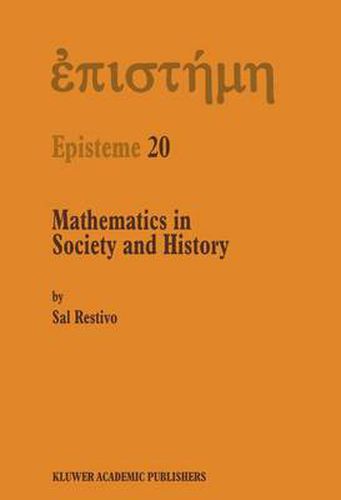Readings Newsletter
Become a Readings Member to make your shopping experience even easier.
Sign in or sign up for free!
You’re not far away from qualifying for FREE standard shipping within Australia
You’ve qualified for FREE standard shipping within Australia
The cart is loading…






Written by a sociologist, this work is devoted exclusively to a general sociology of mathematics and provides examples of different ways of thinking about mathematics sociologically. The survey of mathematical traditions covers ancient China, the Arabic-Islamic world, India, and Europe. Following the leads of classical social theorists such as Emile Durkheim, Restivo develops the idea that mathematical concepts and ideas are collective representations, and that it is mathematical communities that create mathematics, not individual mathematicians. The implications of the sociology of mathematics, and especially of pure mathematics, for a sociology of mind are also explored. In general, the author’s objective is to explore, conjecture, suggest and stimulate in order to introduce the sociological perspective on mathematics, and to broaden and deepen the still narrow, shallow path that today carries the sociology of mathematics. This work should be of interest to specialists in the philosophy, history and sociology of mathematics, people interested in mathematics education, students of science and society, and people interested in current developments in the social and cultural analysis of science and mathematics.
$9.00 standard shipping within Australia
FREE standard shipping within Australia for orders over $100.00
Express & International shipping calculated at checkout
Stock availability can be subject to change without notice. We recommend calling the shop or contacting our online team to check availability of low stock items. Please see our Shopping Online page for more details.
Written by a sociologist, this work is devoted exclusively to a general sociology of mathematics and provides examples of different ways of thinking about mathematics sociologically. The survey of mathematical traditions covers ancient China, the Arabic-Islamic world, India, and Europe. Following the leads of classical social theorists such as Emile Durkheim, Restivo develops the idea that mathematical concepts and ideas are collective representations, and that it is mathematical communities that create mathematics, not individual mathematicians. The implications of the sociology of mathematics, and especially of pure mathematics, for a sociology of mind are also explored. In general, the author’s objective is to explore, conjecture, suggest and stimulate in order to introduce the sociological perspective on mathematics, and to broaden and deepen the still narrow, shallow path that today carries the sociology of mathematics. This work should be of interest to specialists in the philosophy, history and sociology of mathematics, people interested in mathematics education, students of science and society, and people interested in current developments in the social and cultural analysis of science and mathematics.